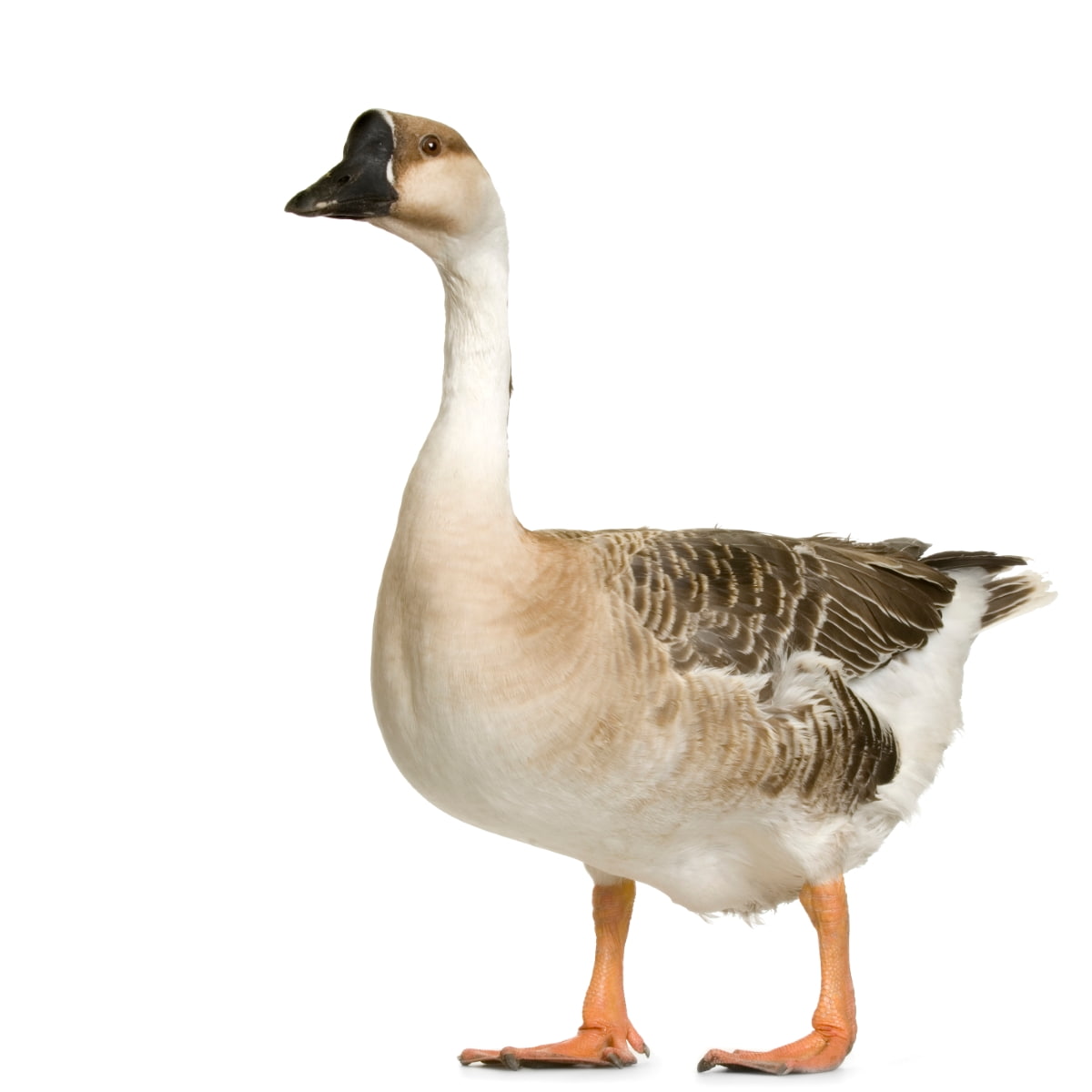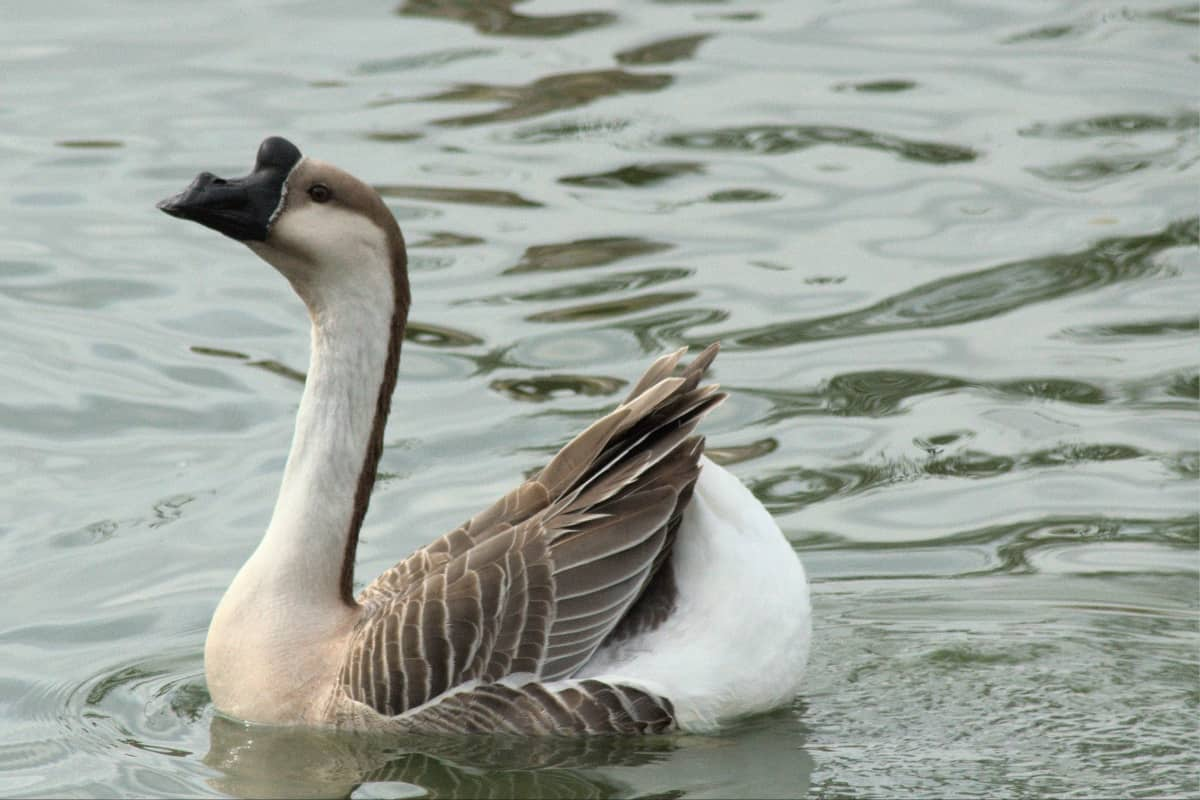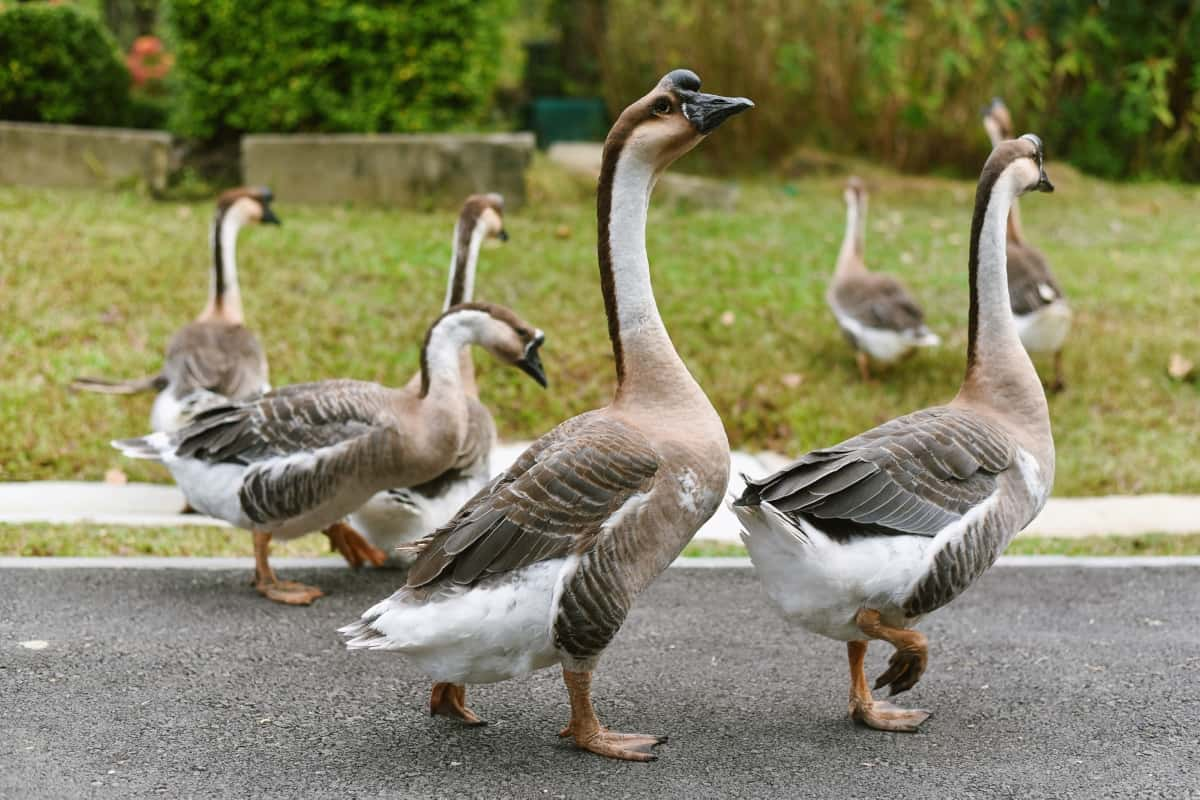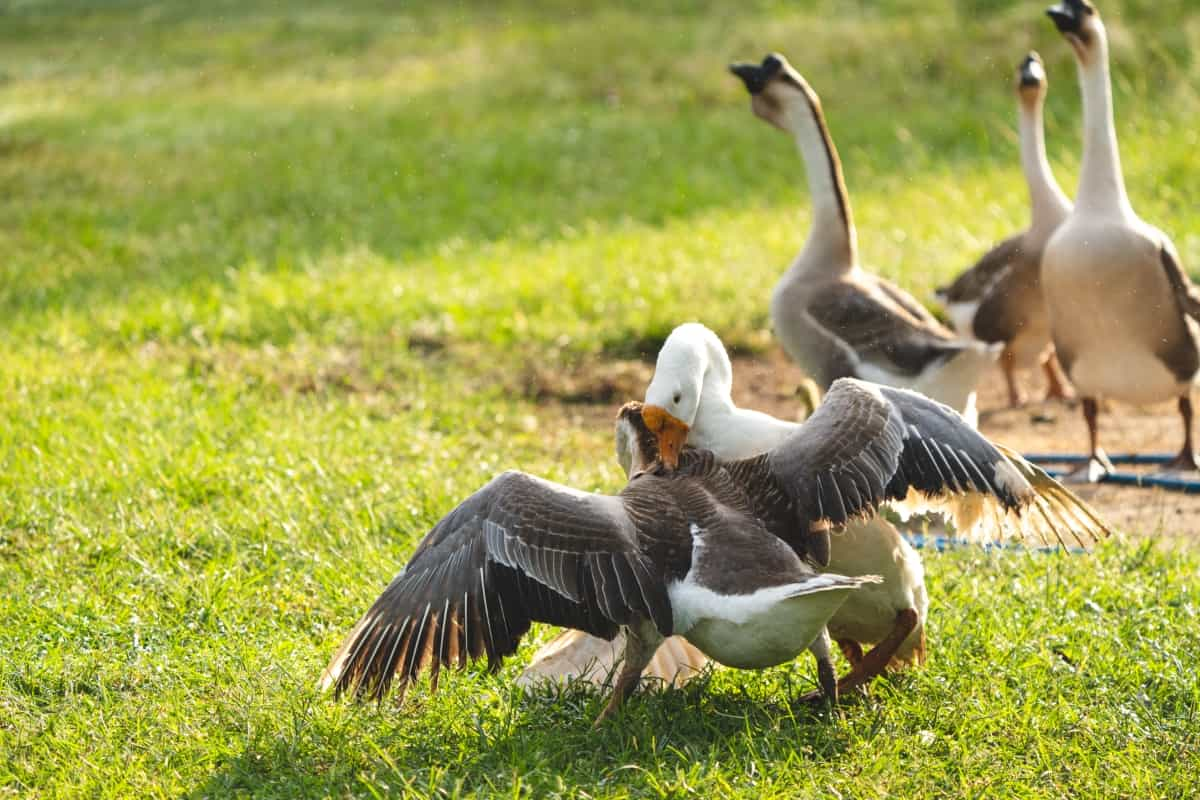African Geese, known for their striking appearance and gentle temperament, are a domesticated breed of waterfowl cherished for various purposes. Characterized by their large size, distinctive knob atop the bill, and graceful posture. Their docile nature, coupled with their excellent foraging abilities, makes them valuable additions to farms, estates, and even urban settings.
History and Origin of African Geese
Despite their name, the African goose is believed to have originated in China. The African goose and Chinese goose share some characteristics, such as color patterns. The African goose’s history intertwines with its domestication in ancient China, where it likely began as a descendant of the Swan Goose (Anser cygnoides).

How to Raise African Geese
African Goose Characteristics
Physical Features
- Size and Weight: Large and robust waterfowl are known for their upright posture and distinctive knob at the base of their beaks. Typically weigh between 7 to 9 kg, with males being slightly larger than females.
- Color Variations: Most commonly found in gray or white plumage, with occasional variations such as brown or buff coloring.
Behavioral Traits
- Social Behavior: Known for their gentle disposition and docile nature, African Geese exhibit a calm demeanor and are often amenable to human interaction. These geese typically display strong social bonds, forming close-knit groups within their flock and demonstrating cooperative behaviors during activities such as foraging and nesting.
- Noisiness and Alertness: While generally quieter than other domestic goose breeds, African Geese remain vigilant and alert, readily sounding alarms in response to perceived threats.
Uses of African Geese
- African Goose Meat Production: African Geese are valued for their lean, flavorful meat, often preferred for its rich taste and juiciness. Their large size makes them efficient for meat production, providing ample yields for consumption.
- African Geese as Pets: Geese are friendly creatures, making them popular choices as pets. Their gentle demeanor and loyal nature endear them to many enthusiasts, fostering companionship and enjoyment within households.
For Weed Control
African Geese are adept at foraging and grazing, making them effective allies in weed control efforts. Their voracious appetite for grasses and plants helps naturally manage overgrowth, offering eco-friendly solutions for maintaining landscapes.
African Goose Egg Production
Not as prolific as other breeds, African Geese still contribute to egg production, offering medium-sized eggs with rich, flavorful yolks. Their eggs are sought after for their nutritional value and unique taste, adding diversity to the poultry egg market.
Housing and Shelter
African Goose housing protects them from harsh weather conditions and predators. The housing should provide enough space for the geese to move around comfortably and fulfill their natural behaviors.
Basic Requirements
- Space Needs: Allocate at least 10-15 square feet per goose for outdoor space, providing access to water for swimming and grazing areas for foraging.
- Protection from Predators: Install fencing around the perimeter, burying it to deter burrowing predators. Utilize secure locks on doors and consider adding motion-sensor lighting or alarms.
In case you missed it: Safeguard Your Flock: Raising Geese to Protect Chickens

Shelter Design and Bedding
- Ventilation and Insulation: Use materials like wood or metal, and provide bedding such as straw or hay for warmth and comfort. Adequate ventilation to prevent moisture buildup and respiratory issues. Insulate the shelter with materials like foam board or straw to maintain warmth in colder months.
- Cleaning and Maintenance: Regularly clean the shelter and surrounding areas to prevent the buildup of waste and bacteria. Replace bedding as needed and inspect the structure for any signs of wear or damage.
Feeding and Nutrition
- Dietary Requirements: African geese’s diet should consist primarily of grass, green vegetation, and grains. A high-quality commercial waterfowl feed for feeding African Geese to ensure they receive essential nutrients like protein, vitamins, and minerals.
- Grazing and Supplemental Feeding: African geese thrive on grazing, which fulfills their natural foraging instincts. Supplemental feeding with grains, such as corn or barley, ensures they receive additional energy and nutrients, especially in colder months or when natural forage is limited.
- Water Needs: Adequate access to clean water is crucial for African geese to maintain hydration, aid digestion, and regulate body temperature. Each bird requires around 1 to 2 liters per day.
- Importance of Clean Water: Clean water is vital for preventing diseases and ensuring the overall health of African geese. Contaminated water can lead to illness and negatively impact growth and productivity. Regularly changing and cleaning water sources is essential for their well-being.
Health and Wellness
Common Health Issues
African geese may encounter common health issues such as respiratory infections, bumblefoot, and obesity. Respiratory infections can result from poor ventilation, while bumblefoot may arise due to unsanitary living conditions or excessive time spent on hard surfaces. Obesity can occur if geese are overfed or lack exercise.
Parasites and Diseases
Geese are susceptible to parasites like worms, mites, and ticks, as well as diseases such as avian influenza and avian cholera. Regular deworming and maintaining a clean environment help prevent parasite infestations, while vaccination can mitigate the risk of infectious diseases.
Preventative Care
Proper nutrition, adequate shelter, and regular exercise for maintaining the overall health and wellness of African geese. Providing access to clean water and a balanced diet rich in nutrients is crucial. Also, ensuring a clean and spacious living environment for African Goose health management.
Vaccinations and Regular Check-Ups
Consulting with a veterinary doctor experienced in avian health is recommended for vaccinations and regular check-ups. Vaccinations can protect against common diseases, while regular vet doctor visits allow for early detection and treatment of any health issues. Routine check-ups should include examinations for signs of illness, parasite screenings, and nutritional assessments.
Breeding African Geese
- Breeding Season: Breeding African Geese occurs in the spring, from February to April, when daylight increases, triggering hormonal changes in geese.
- Timing and Pairing: Pairs form naturally within the flock, with ganders courting females through displays and vocalizations. Introduce pairs or trios in late winter to allow bonding before breeding season.
- Incubation and Hatching: Geese prefer to build nests on the ground, typically near water. Incubation lasts around 28-35 days, with ganders guarding the nest and providing protection.
- Egg Care and Monitoring: Inspect eggs regularly for signs of damage or contamination, and turn them daily to prevent embryos from sticking to the shell. Maintain proper humidity and temperature in the incubator for successful hatching.
In case you missed it: Alabio Duck Breed: Origin, Characteristics, Price, Life Span, Appearance, and Temperament

Raising Goslings
Brooding Requirements
Temperature and Humidity Control: Goslings require a brooder with a temperature of 30-35°C for the first week, decreasing by 2.5°C each week until reaching ambient temperature. Humidity should be around 60-70% initially, gradually decreasing. Utilize heat lamps or brooders to maintain appropriate temperatures. A thermometer and hygrometer help monitor conditions, adjusting as needed to ensure comfort and health.
Feeding Young Geese: Provide access to clean water and a balanced starter feed specifically formulated for goslings. Fresh greens like lettuce and spinach can also be introduced gradually.
Starter Diet and Growth: Offer a starter diet containing around 20-22% protein to support healthy growth and development. Monitor growth rates and adjust feeding amounts accordingly to prevent overfeeding or malnutrition. Regular observation and African Geese care are essential for raising thriving goslings.
Handling and Behavior Management
Taming and Training: Start with gentle handling and positive reinforcement. Use treats to encourage desired behaviors like coming when called or being comfortable with handling.
Tips for Handling
- Gentle Approach: Approach slowly and calmly, avoiding sudden movements. Allow the goose to approach you first.
- Use Protective Gear: Wear thick gloves and long sleeves to protect against bites.
Managing Aggression
- Identify Triggers: Understand what provokes aggression, such as territorial behavior or feeling threatened.
- Establish Boundaries: Set clear boundaries and consistently enforce them to prevent aggressive encounters.
Understanding and Mitigating Aggressive Behavior
- Socialization: Ensure geese are properly socialized from a young age to minimize aggression towards humans.
- Redirect Aggression: Use distraction techniques or positive reinforcement to redirect aggressive behavior towards more appropriate outlets, like toys or designated areas.
In case you missed it: What to Feed Baby Ducks in an Emergency: Recommended Diet

Conclusion
African Geese are versatile and attractive birds that can be a valuable addition to farms. With proper care, raising African Geese can provide meat, eggs, and pest control while adding beauty and interest to the landscape.
- Feed Your Flock for Less: Top 10 Tips to Save on Chicken Feed
- Ultimate Guide to Ossabaw Island Hog: Breeding, Raising, Diet, and Care
- Hatching Answers: The Top 10 Reasons Your Chickens Aren’t Laying Eggs
- Eggs and Economics: Breaking Down the Cost of Raising Backyard Chickens
- Defend Your Greens: Proven Methods to Keep Iguanas Out of Your Garden
- Ultimate Guide to Cinnamon Queen Chicken: A Comprehensive Guide for Beginners
- Ultimate Guide to California Tan Chicken: Breeding, Raising, Diet, Egg-Production and Care
- Ultimate Guide to Marsh Daisy Chicken: Breeding, Raising, Diet, and Care
- 10 Types of Chicken Farming Businesses You Can Start for Profits